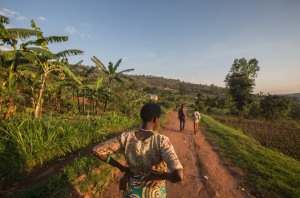I’m going to go straight to it: Because advocacy is politics.
Advocacy is aspirational; it is rhetorical; and it is manipulative. And none of those things is prima facie bad (though there are better and worse ways to do them).
It seems to me we should no more expect advocates to offer a nuanced and complex view of the world than we should expect House or Senate candidates to run television ads that do the same. “Raising awareness” to create political will is like running for office. If advocates are going to engage the political process in order to influence it, it’s fair to expect them to talk like politicians.
Advocates are trying to move political levers. Save Darfur, ENOUGH, the Genocide Intervention Network — chosen as examples because I more or less follow what they’re up to, although they’re pretty different species — are all engaged in this nebulous activity they usually describe as “creating political will.” Anyone who has spent any time around NGOs at the UN, in DC, or in the field will inevitably hear the phrase “lack of political will” repeated with a knowing helplessness. We’re all savvy enough to know that’s a problem, but we haven’t figured out how to overcome it yet.
Advocacy is taking steps in that direction. The LRA bill, the Congo minerals act — whatever you think of them, they are clear demonstrations of overcoming the political will hurdle. The problem, of course, is that this kind of political will isn’t exactly the litmus test you want for, say, saving a Congolese woman from rape. Passing a bill is a feat of domestic politics; it doesn’t mean it has the effect you intend halfway around the world. Or any effect at all.
I don’t that’s because advocacy is too simplistic, gets the message wrong, etc. I think the problem is how we understand political will, as this stuff we either have or we don’t, that we can either point to a bill and prove we overcame, or we can’t. I don’t actually think political will is that binary. Or even, really, a thing. I think it’s actually thousands of decisions that get made, in Washington (to be American-centric about it) or in New York, at every step of what turns out to be a ridiculously drawn out political process. To take up the example that gives birth to the political will obsession, every UN security council resolution that ended with “seized of the matter” during the Rwandan genocide represented a consensus — in that case, not to do anything — after who knows how many individual conversations, consultations, and negotiations between actors of varying alleg
A Security Council resolution that fails to protect people does not represent a moment in which political will was missing; it represents the culmination of a process in which it was absent or weak. Every time a group of two or more people discuss an issue, whether it’s Rwanda in April 1994 or Congo today, you need ‘political will’ in the room. When it grows, it seems to grow exponentially, but not unless it’s there every time.
And at the risk of sounding like an idiot, let’s keep in mind that political will is, uh, political. It often gets bandied about as if it were a synonym for “do the right thing,” and it’s not. The motives of those who muster that will can be multiple, and they are certainly varied. That doesn’t make the choice to do something necessary any less worthy, just as good intentions don’t make the choice to do something stupid any less stupid.
All of this is not to let “badvocacy” off the hook entirely. Advocates should do a better job of us reassuring the rest of us who aren’t the target grassroots audience, who can point to Goma on a map in one try, that they know the difference between the politics and the policy. We assume that when our Senators get to Washington, they have discussions of greater depth and nuance than their 30-second TV spots. And while that, too, may be naive, it’s probably also the backbone of American democracy, so I’m going with it.
What the rest of us can do a better job of us capitalizing on the interest they create and moving that interest toward nuanced policy. On Congo minerals, I’m encouraged by the room to do exactly this that Jason Stearns describes in his annotation of the new legislation.
Since ENOUGH has led the Congo charge, and takes (brings on itself?) a lot of the heat of advocacy criticism, I’ll mention I actually think they’ve got a promising model. I’ve talked with some of the group’s staff who aren’t out traveling the jungle with a 60 Minutes crew, and they’re damn smart. John Prendergast could do us all a favor by keeping mum a little more often, but he’s writing the op-eds, not the policy memos. The fact that the organization knows the difference — and exploits it — seems to me at the very least promising, sometimes even effective. Presuming you accept the advocacy-as-politics hypothesis.
Meanwhile, I would say we journalists can do better. Journalists should no more let advocates frame an issue in a way that suits their interests than we should let politicians. Though we can’t all run to Congo and vet the mineral chains ourselves, alas. And, if I may, the missing attributions, unnecessarily vague details, unnamed sources and other weaknesses of the latest Enough blog post from Congo remind that issues still need journalism, no matter what the advocacy model.




Jina, glad to have a journalist’s perspective on the conversation. I tried to articulate a defense for the advocacy world last week, but it was just me and the academics!
I also appreciate your interrogation of “political will” — it’s a phrase that we throw around too carelessly.
Thanks, Dave. Although as a journalist I’m uncomfortable with the idea of ‘defending’ any one side or the other… I just want to challenge some of the conventional wisdom. I spend a lot of time challenging the conventional wisdom of advocates here, but this goes in another direction, perhaps. Thanks for engaging.
Hi Jina,
Interesting post on advocacy debate and how that affects the issue. I’ll admit I’m both a devoted activist and aspiring journalist (my current major). I really haven’t thought about the points you brought up on how the phrase “lack of political will” gets thrown around but there is no solution to overcome it. And your other point on how advocates and politicians use the same tools to speak out about their causes. I spoke with my elected repersentative about the LRA bill and I felt I had made a difference – although in a small way. It certaintly better than doing nothing at all if you ask me (if my tone seems harsh, my apologies). Anyway, great job Jina. Look forward to reading more of your commentary.
this is all politics, am in the middle of it here since more than 10 years (tradings the 3 T’s), if this goes on the whole region will be without income and people will join militia groups and tings will get much worse, which will create much income for the UN, US mining firm that will go in after (some already since they “financed” Kabila father to go up to Kinshasa against $50 000 000,-), ect ect ect; Very sad but that’s how the world works, like the Americans say “money talk”, money is the forst power on the scale of powers anywhere in the world …………………………………………
GMH